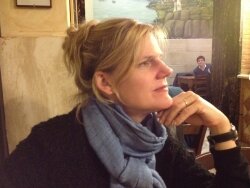Nell Casey: Swimming through Spalding Gray
Around 2007, Kathleen Russo, widow of monologuist Spalding Gray, approached author Nell Casey about writing Gray’s autobiography. Gray, who committed suicide in 2004, spent his career publicly, nakedly chronicling his life in monologues like Swimming to Cambodia.
Casey asked herself: Had Gray already said everything onstage?
The answer: a resounding no. The journals showed her that there much more than the man's famous monologues. “It wasn't possible for Gray to chronicle or confess all aspects of his life publicly," says Casey, "but privately he did so.”
She also quickly realized something else: that the journals “are not only generously written, they are gorgeously written.”
The avalanche of new material was only the beginning as Casey, now 41, drew upon sources ranging from audiotapes of Gray's therapy sessions, she says, to random notes written on scraps of paper, like “an Amtrak napkin and a breast cancer pamphlet.”
Gray’s brothers and his colleagues aided Casey. His widow allowed herself to be presented “as flawed and criticized” as anyone else under Gray's powerful pen.
The result was The Journals of Spalding Gray, published in 2011. Casey, the daughter of local author John Casey, had previously explored despondent authors’ lives in her 2002 book, Unholy Ghost, a collection of essays by writers who had survived depression.
An editor approached Casey with that book’s concept, not knowing that Casey had recently guided her sister Maud through “a difficult depression,” she says. Casey and her sister’s essays for the book inspired a series of “partner essays... by the person who’d struggled with depression” and their caregiver, Casey explains. Author William Styron and his wife Rose were one such pair.
In 2008, Casey expanded on this particular theme by editing An Uncertain Inheritance: Writers on Caring for Family. “It's stunning to think of how little we talk about family care-giving,” Casey says, “given how frequently it occurs.”
Depression’s incapacitating nature would seem to make it a static topic, but that isn’t so, Casey says.
“It helped that there were so many different writers with varied experiences offering their stories,” she says. “It allowed for the definition of depression to open up— to be told in many different ways and with different perspectives and insights. I was grateful to see this subject in this kind of Rashomon way. I began to understand how vastly different— and yet oddly the same— the struggle can be.”
And, ultimately, exorcizing these horrible experiences is incredibly life-affirming: “I think that when you can draw material and shape a narrative from something that has caused you great pain, you often feel some sense of triumph or peace.”
~
Nell Casey appears on a panel entitled “The Lives of Writers” with author Jean Cash (Larry Brown: A Writer’s Life) on Friday, March 23 at 2pm at the UVA Bookstore.
